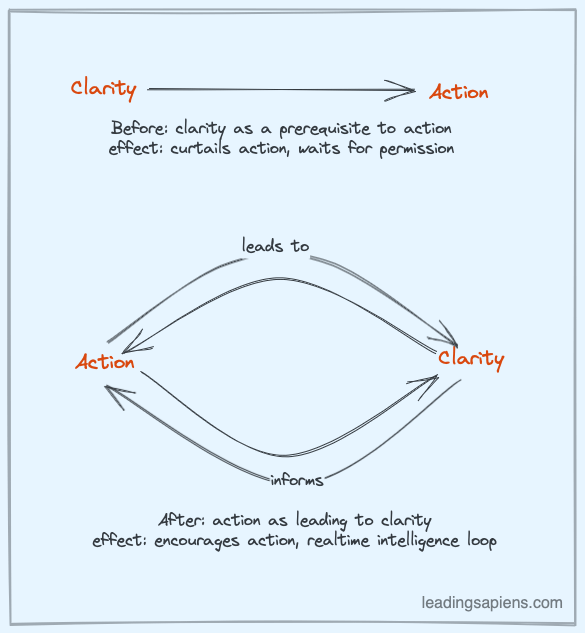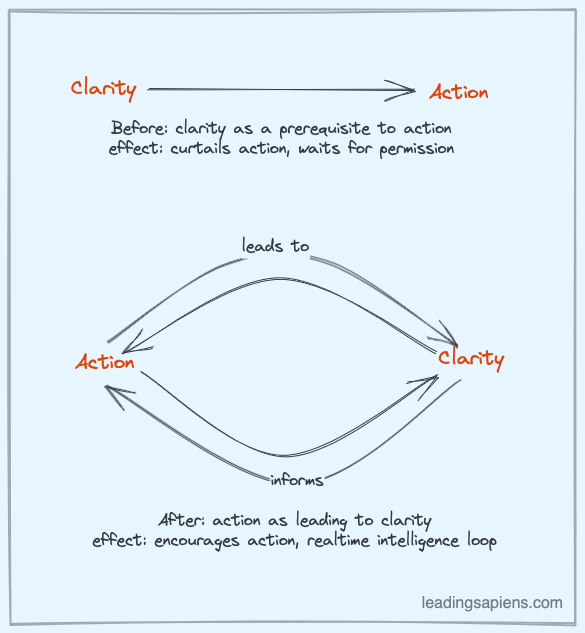Often in coaching engagements, clients are asked to "try on" a new behavior just as they would try on new clothes at the store so they get a "feel" for it. The pushback often comes in the form of "but I don't know how to do that".
We've all been there : how are you supposed to "do" something if you don't know to begin with?
Some expect prescriptive "playbooks" that can cover any eventuality. But this ignores and undermines our natural learning abilities. It also doesn't recognize a fundamental paradox — for me to learn something new, I have to first do something that I don't know yet. If I already know how to do it, I am not really learning anything new.
The predicament and tension of real learning
Donald Schon, MIT professor emeritus and organizational learning expert, captured this dynamic in his classic Educating the Reflective Practitioner. He cites the experience of the student in the architectural design studio:
The design studio shares in a general paradox attendant on the teaching and learning of any really new competence or understanding; for the student seeks to learn things whose meaning and importance she cannot grasp ahead of time.
Plato mentions this as well in Meno:
She is caught in the paradox Plato describes so vividly in his dialogue the Meno. There, just as Socrates induces Meno to admit that he hasn't the least idea what virtue is, Meno bursts out with this question:
"But how will you look for something when you don't in the least know what it is? How on earth are you going to set up something you don't know as the object of your search? To put it another way, even if you come right up against it, how will you know that what you have found is the thing you didn't know? "
Like Meno, the design student knows she needs to look for something but does not know what that something is. She seeks to learn it, moreover, in the sense of coming to know it in action. Yet, at the beginning, she can neither do it nor recognize it when she sees it.
Hence, she is caught up in a self-contradiction: "looking for something" implies a capacity to recognize the thing one looks for, but the student lacks at first the capacity to recognize the object of her search. The instructor is caught up in the same paradox: he cannot tell the student what she needs to know, even if he has words for it, because the student would not at that point understand him.
The logical paradox of the Meno accurately describes the experience of learning to design. It captures the very feelings of mystery, confusion, frustration, and futility that many students experience in their early months or years of architectural study.
This tension between our wanting to know before acting and the need to act before knowing in order to learn is what Schon called the predicament and paradox of learning:
The paradox of learning a really new competence is this:
that a student cannot at first understand what he needs to learn, can learn it only by educating himself, and can educate himself only by beginning to do what he does not yet understand.

Discarding preexisting notions
A studio master in one of his studies termed it as a "willing suspension of disbelief":
It has to be a kind of contract between the two. The teacher must be open to challenge and must be able to defend his position. The student, in turn, must be willing to suspend his disbelief, to give the teacher’s suggestion a chance—to try the suggestion out. The student must be willing to trust that the faculty member has a programmatic intention which will be preempted or ruined by his requiring full justification and explanation before anything is done. … A good student is capable of the willing suspension of disbelief.
...phrase originated with Samuel Taylor Coleridge, who used it to describe the stance essential to an understanding of poetry . In order to allow a poem to do its work, Coleridge thought, the reader must enter into a kind of contract with the poet, willingly suspending his disbelief in utterances that seem false or even absurd.
The reader is not asked to will “belief,” because he cannot be expected to make an informed choice to believe until he understands, which depends, in turn, on his having the right sort of experience. Disbelief must be suspended until the reader (or student) has access to the information on which to base a good decision. But in order to get that information, he must commit to the enterprise that yields the experience.
Real learning is painful
Keep in mind, one of the reasons we are not willing to undergo this "suspension of disbelief" is because it comes with the psychological discomfort of being in unchartered territory and the real risk of coming out empty on the other side of the transaction.
What makes this situation into a predicament for the student is that he or she is likely to find the costs of commitment greater than its expected rewards. Perhaps the least of these costs is the opportunity cost of remaining in the studio. More important is the sense of being at risk.
Swimming in unfamiliar waters, the student risks the loss of his sense of competence, control, and confidence. He must temporarily abandon much that he already values. If he comes to the studio with knowledge he considers useful, he may be asked to unlearn it.
As he willingly suspends disbelief, he also suspends autonomy—as though he were becoming a child again. In such a predicament, he is more or less vulnerable to anxiety, depending on the strengths and weaknesses he brings to the studio.
If he is easily threatened by the temporary surrender of his sense of competence, then the risk of loss will seem to be high. If he comes with a distrust of those in authority, a readiness to see them as manipulating him, especially if he is unaware of his dispositions to perceive, then the willing suspension of disbelief may seem difficult or even impossible.
Real learning is messy
It also runs counter to our modern day culture of wanting guarantees exemplified by terms like "hack", "proven" and "research backed". Nothing wrong with this except the terms have their origins in the scientific and material domains. The human domain tends to be not as straightforward or linear.
The success of coaching engagements is often dependent on the willingness of both parties to dabble in the mess of interpreting new experiences that eventually add up to transformative learning.
The student must begin to design before she knows what she is doing, so that the studio master's demonstrations and descriptions can take on meanings useful to her further designing.
But this "virtuous circle" depends on the capacity of student and studio master to communicate effectively with each other, in spite of the potential for vagueness, ambiguity, or obscurity inherent in the things about which they try to communicate.
Questions to consider
- How many endeavors did we quit because the pain of discomfort was too high?
- How many projects did we not start because of the risk of looking foolish?
- When embarking on a new front, are you wanting to know everything before you start? How might that be limiting you?
Further reading
Schon's fellow Harvard researcher Chris Argyris wrote about why professionals struggle with learning to learn. Peter Senge took it one step further and highlighted how learning can be a central part of organizational strategy.
Learning is an essential aspect of our lives and careers and yet we don't understand the mechanics well. Knowing the underlying dynamics and related pitfalls can help accelerate our learning curves.


